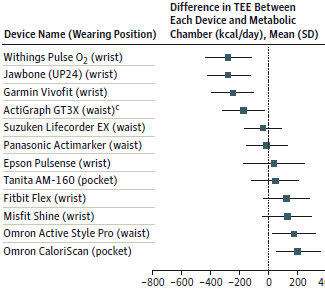Activity trackers don't measure energy expenditure. Should you care?

Earlier this week Alex Hutchinson reported on a new study examining the accuracy of activity monitors (Fitbits, Jawbone, etc) for measuring energy expenditure. Not surprisingly, the results suggest that none of the activity monitors were 100% accurate. The authors compared 12 different activity monitors to 2 different gold standards (a metabolic chamber, and doubly labelled water), and both techniques found that most monitors either over or under-estimated energy expenditure.
The question is, should you care? For most people, probably not.
Activity monitors measure movement, not energy expenditure
I do a fair amount of work with activity monitors (full disclosure: I've received research support from pedometer companies Stepscount and Pacific Rim Wellness). And in the past I've worked with people who do a LOT of work with activity monitors. For example, people who develop and then publish their own code for analyzing raw accelerometer data. Nerds, but nerds who know a helluva lot about activity monitors.
When I first got into this area of study, one of the first things I was told by a senior nerd colleague was that activity monitors measure movement. They do not measure energy expenditure. By and large, they are pretty good at measuring movement. The problem is that no two people burn the same number of calories for a given amount of movement. So in order to provide you with an estimate of energy expenditure, activity monitors need to make a bunch of assumptions based on your age, sex, ethnicity, muscle mass, etc. Not surprisingly, the more things you have to guesstimate, the less accurate the results are going to be.
This is not unlike the feedback provided from a treadmill during a run – the distance info should be very accurate, but the calories burned may be off by a considerable margin (at least with activity monitors, they seem to largely under-estimate, rather than over-estimate caloric expenditure). If you are using an activity monitor to measure your activity levels, then you're probably getting reasonably accurate feedback. If you're using it to estimate your caloric expenditure (e.g. as a way to determine the number of calories you should eat each day to maximize weight loss), then you might want to be a bit more cautious.
As Alex points out in his post, however, most activity monitors are still reasonably accurate when it comes to estimating energy expenditure. In fact, several were impressively accurate, especially given the assumptions needed to estimate energy expenditure from movement. They're just not as accurate as they are for measuring movement (which could be an issue for people who really need to have a precise estimate of their caloric expenditure). But perhaps more importantly, they are consistent. In many ways, consistency is more important than accuracy – the clock in my car is 7 minutes fast, but it's always 7 minutes fast, so it doesn't cause me much trouble. On the other hand, a clock that is sometimes accurate, but sometimes fast or slow, would be a lot less useful.
I would suggest that researchers take these results to heart as well. If your participants are wearing an activity monitor, report the activity levels, rather than energy expenditure.
This story is republished courtesy of PLOS Blogs: blogs.plos.org.



















